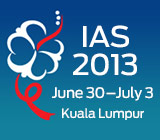 When people taking AbbVie’s five-drug combination therapy to treat hepatitis C virus (HCV) reduced their dose of ribavirin because of side effects, there was no reduction in their likelihood of achieving a sustained virologic response (SVR, considered a cure), aidsmap reports. AbbVie representatives presented a new analysis of their Phase II AVIATOR study at the 7th International AIDS Society Conference on HIV Pathogenesis, Treatment and Prevention (IAS 2013) in Kuala Lumpur.
When people taking AbbVie’s five-drug combination therapy to treat hepatitis C virus (HCV) reduced their dose of ribavirin because of side effects, there was no reduction in their likelihood of achieving a sustained virologic response (SVR, considered a cure), aidsmap reports. AbbVie representatives presented a new analysis of their Phase II AVIATOR study at the 7th International AIDS Society Conference on HIV Pathogenesis, Treatment and Prevention (IAS 2013) in Kuala Lumpur.
The AVIATOR study, presented at the International Liver Congress (EASL 2013) earlier in the year, showed SVR rates of 96 percent among treatment-naive study participants and 93 percent among prior null responders to treatment (in other words, among those who previously tried treatment but weren’t cured). This new analysis of that study took a look at a subset of 247 study participants with genotype 1 of hep C who did not have cirrhosis, including 159 who were treatment naive and 88 who were prior null responders. These participants took either 100 or 150 milligrams of the protease inhibitor ABT-450 boosted with ritonavir once a day, 25 mg of the NS5A inhibitor ABT-267 once a day, 400 mg of the non-nucleoside polymerase inhibitor ABT-333 twice a day and 1,000 to 1,200 mg weight-based ribavirin once a day for either 12 or 24 weeks.
The treatment regimen proved safe and well tolerated on the whole. Four of the participants (1.6 percent) stopped treatment because of adverse effects. Sixteen (6.5 percent) experienced a drop in hemoglobin, indicating moderate anemia, and one person (0.4 percent) saw a drop that indicated severe anemia.
Twenty-four participants (10 percent) reduced their ribavirin dose as a consequence of toxicity, with not much difference between the 12- or 24-week arms of the study. Those who were taking hep C therapy for the first time were more likely to reduce the ribavirin dose and to do so earlier in the trials. In addition to the 14 people who reduced their dose because of anemia, about two or three participants out of each of the following categories of side effects consequently reduced their ribavirin dose: fatigue, raised creatinine, diarrhea, dizziness, shortness of breath and itching.
The SVR rate 24 weeks after completing therapy for those who reduced their ribavirin dose was 100 percent, compared with 92 percent for treatment-naive participants and 94 percent for null responders who kept at the full dose.
To read the aidsmap report, click here.
To read the conference abstract, click here.
Advertisement
Advertisement
Advertisement






1 Comment
1 Comment